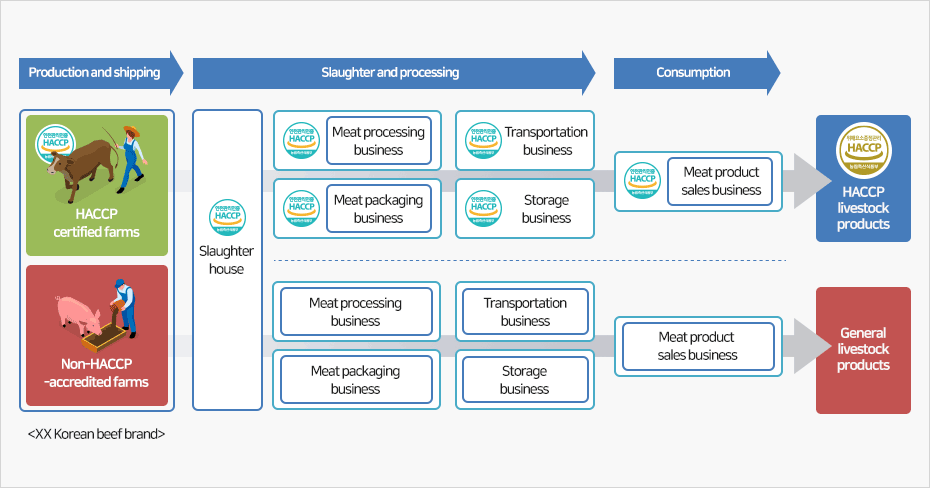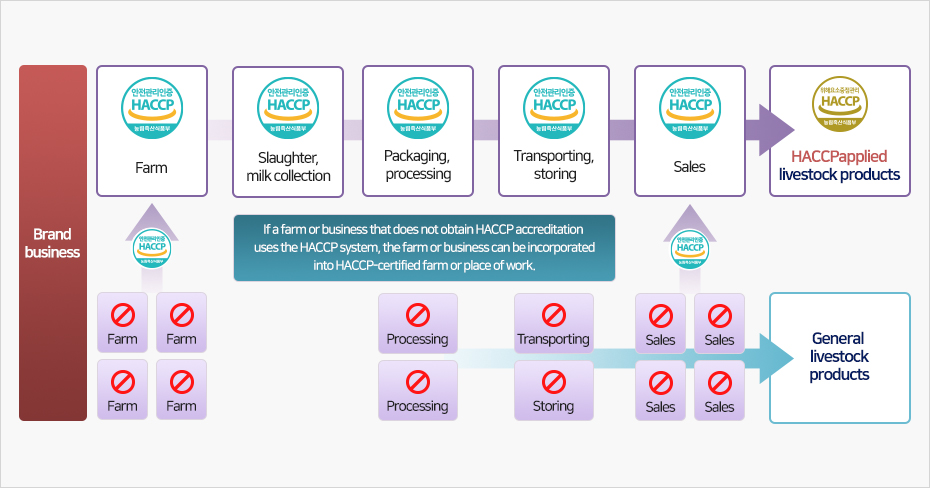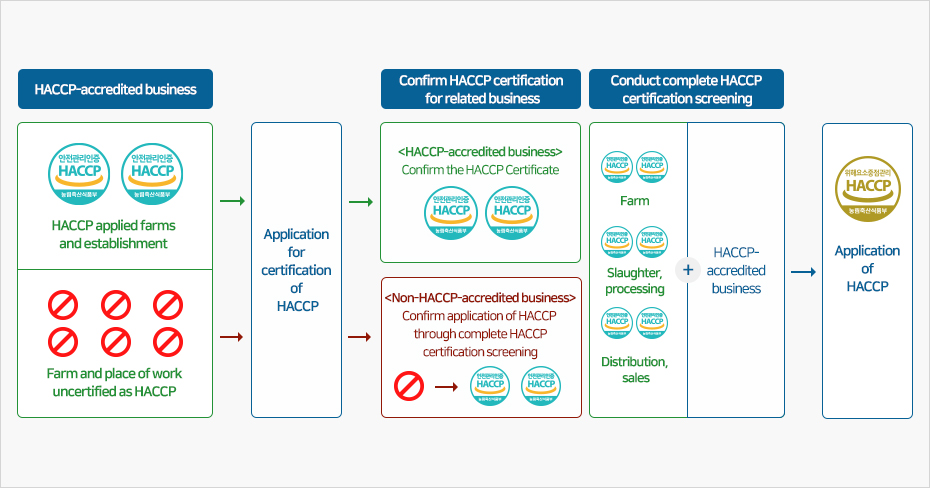Introduction to the system
Purpose
·To promote the effectiveness of the HACCP system by producing authentic HACCP-applied livestock products through linkage of all management stages from farm to sales.
·To enhance public health by expanding the supply of safe and hygienic livestock products through scientific analysis and management of hazards at each stage.
Definition
·Analysis and management system for possible hazards at all stages from farms to tables (enforced on January 31, 2014).
·To demonstrate that HACCP is being implemented in the entire process of raising livestock and processing, distributing and selling HACCP-applied livestock products.

Relevant laws
·Livestock Products Sanitary Control Act, Article 9 (HACCP Standards of Livestock Products) Article 41 (Fees)
·Enforcement Rule of the Livestock Products Sanitary Control Act, Article 7 (3) to (5) (Application for Certification, etc., of HACCP-accredited Business)
·Food and Livestock Products Safety Management Certification Standard, Article 7 (HACCP for Livestock Products)
Subject and target of certification
Relevant subject
·Certification screening, survey and assessment and extension review: Korea Agency of HACCP Accreditation and Services (KAHAS)
·Administrative authority including revocation of certification for HACCP-accredited business: the Ministry of Food and Drug Safety
Target of certification
·National Agricultural Cooperative Federation and Korea Federation of Livestock Cooperatives, which can manage the application of HACCP in the entire distribution stage of livestock products, as well as farm managers, livestock products processors, and livestock products wholesalers.
Relevant laws
Enforcement Rule of the Livestock Products Sanitary Control Act」, Article 7 (3) (Application for Certification, etc., of HACCP-accredited Business)
③ A person or business prescribed by Ordinance of the Prime Minister, such as Korea Federation of Livestock Cooperatives according to the Agricultural Cooperatives Act, means any of the following cases:
1. Korea Federation of Livestock Cooperatives according to the Agricultural Cooperatives Act;
2. A farm manager according to the Act on Fostering and Supporting Agricultural and Fisheries Business Entities; and
3. An operator of livestock processing or livestock sales business with an annual KRW five billion or more sales revenue.
Certification requirements and operation plan
Glossary
·HACCP-accredited business: Brand business or distribution corporations that comply with HACCP at all stages
·HACCP program: Sanitation management program for applying HACCP to each place of work, business establishment and farm participating in the integrated certification system
·Participating business: a place of work, business establishment or farm that has made a participation agreement with HACCP institution (including compliance with HACCP program for more than three years)
Document (reference: Enforcement Rule of the Livestock Products Sanitary Control Act, Article 7 (3) 4)
·Form 4 of Annex 1 of Application for Certification of HACCP
·Document confirming the target of HACCP
·Regulations regarding formation and operation of HACCP team to manage and operate HACCP
·Managerial performance of HACCP for over three months
·A copy of the contract signed with a place of work, business establishment and farm participating HACCP (at least 3 years)
·Document related to a place of work, business establishment, and farm experiencing HACCP (e.g. certificate)
Certification requirements (reference: Enforcement Rule of the Livestock Products Sanitary Control Act, Article 7 (3) 5)
·Establishing and operating HACCP program
·Securing and contracting with a relevant business establishment that complies with HACCP standards at the entire stages of livestock products from raising to distributing
※ The contract shall contain the minutiae about compliance with the standards by the place of work, business establishment and farm participating HACCP, the term of which must be at least three years.
·Establishing and operating sanitation program and individual HACCP standards by a place of work, business establishment and farm participating HACCP
·Completing legal education and training concerning HACCP by an operator and staff of a place of work, business establishment and farm participating HACCP
Operation plan
·HACCP-accredited business must secure a distribution network only for HACCP by classifying and managing HACCP-certified livestock products at each stage
·Even if only some parts of the HACCP system are applied, the business with a HACCP chain can still apply for HACCP certification. If a business that does not obtain HACCP accreditation uses the HACCP system after being certified, it can be incorporated into HACCP-certified business establishment through application for change in certification of HACCP applied

·When a HACCP-accredited business applies for certification, including the place of work, business establishment and farm that does not obtain HACCP, an individual HACCP certification screening is conducted for each business.
·After completing the HACCP certification screening for a place of work, business establishment and farm that does not obtain HACCP, the review will be conducted for the HACCP-accredited business and related business.

